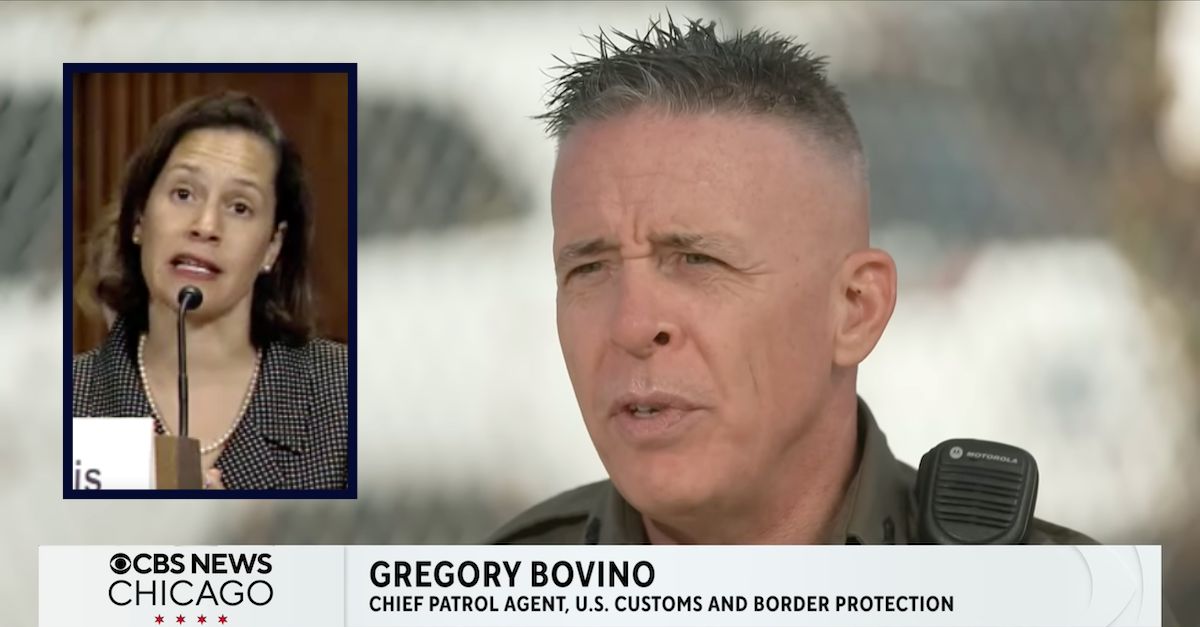
Left inset: U.S. District Judge Sara Ellis pictured during a nomination hearing on June 19, 2013 (Senate Judiciary Committee). Right: Chief Patrol Agent Gregory Bovino defends uses of force in local news interview (CBS News Chicago).
After the Trump administration aggressively sought an "extraordinary" writ to shut down a federal judge's order, which required a U.S. Customs and Border Protection (CBP) chief to provide daily in-person updates in court about "use of force activities," a federal appeals court in Illinois promptly halted the command and set the stage for a potential judicial scolding.
On Tuesday, U.S. District Judge Sara Ellis of the Northern District of Illinois made waves by requiring Chief Patrol Agent Gregory Bovino to appear in court, and in person, each day during the week at 5:45 p.m. to "report on […] use of force activities."
The order was issued in the context of a civil lawsuit over "Operation Midway Blitz," alleging federal agents unleashed "brutality" on Chicago-area streets to "prevent the press, elected officials, religious leaders, and civilians engaged in peaceful protest from exercising their First Amendment rights" outside the Broadview ICE facility and elsewhere.
Following a hearing Tuesday, Ellis issued a series of orders — requiring agents to have clear identifiers on their uniforms and to wear body cameras, as well as demanding daily updates from Bovino, who was taken to task after an Oct. 23 video showed him hurling tear gas into a crowd, in apparent violation of a temporary restraining order (TRO) curtailing the use of excessive "crowd-control" force.
Love true crime? Sign up for our newsletter, The Law&Crime Docket, to get the latest real-life crime stories delivered right to your inbox
The DOJ responded Wednesday by calling on the 7th Circuit U.S. Court of Appeals to at least issue a stay posthaste. The government said Ellis' "extraordinary and extraordinarily burdensome" order was "entered without any formal finding that the government failed to comply with prior court orders," making it a "clear abuse of discretion" that "violates the separation of powers."
"That unprecedented order," the DOJ said, "interferes with Chief Bovino's ability to undertake his responsibilities, is unnecessary to secure compliance with the TRO, and is completely untethered to the claims and allegations underlying this lawsuit."
"Requiring a senior executive official to appear for daily questioning far exceeds the recognized bounds of discovery. The order significantly interferes with the quintessentially executive function of ensuring the Nation's immigration laws are properly enforced by waylaying a senior executive official critical to that mission," the Trump administration continued. "And the order only underscores the extent to which the court has exceeded its judicial role by implementing vastly overbroad relief and arrogating to itself the role of supervising and micromanaging the day-to-day operations of Executive Branch law-enforcement agencies."
The 7th Circuit acted accordingly and swiftly issued an administrative stay of Ellis' order — specifically taking Bovino off the hook for now as far as the daily in-person updates are concerned — as the appellate court weighs whether to grant the Trump administration's request for "extraordinary" relief in the form of a writ of mandamus.
If mandamus follows, Ellis, a Barack Obama appointee, would be forced to vacate her own order for having been a "clear abuse of discretion" or "judicial usurpation."
"Pending a decision on the petition for a writ of mandamus, the district court's October 28, 2025 order is temporarily stayed only to the extent it required Gregory Bovino to appear in court, in person, each weekday at 5:45 PM," read the order, signed by no particular circuit judge. "It is further ordered that plaintiffs shall respond to the petition by 5:00 pm on October 30, 2025."
Comments